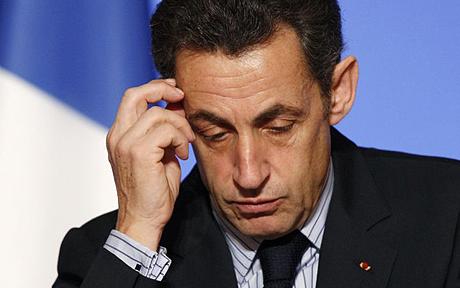Ex-French President Nicolas Sarkozy has been placed under formal investigation over alleged influence peddling.
He appeared before a judge in Paris late on Tuesday after 15 hours of questioning by anti-corruption police.
This is thought to be the first time a former French head of state has been held in police custody.
Mr Sarkozy’s lawyer, Thierry Herzog, and senior prosecutor Gilbert Azibert were also placed under formal investigation over the allegations.
A second prosecutor called in for questioning, Patrick Sassoust, had not appeared before a judge as of Tuesday night.
When a suspect is placed under formal investigation, he or she is then examined by a judge, who determines whether there is sufficient evidence for the suspect to be charged.
The step often, but not always, leads to trial. Influence-peddling can be punished by up to 10 years in prison and a fine of 150,000 euros (£120,000; $205,000).+
‘Not a lot’
Mr Sarkozy was released from custody around midnight (22:00 GMT) after appearing in court in Paris.
He had been brought to the court from the judicial police office in Nanterre, west of the French capital, where he had been interrogated.
Investigations into Sarkozy
July 2014: Placed under formal investigation on suspicion of peddling influence to obtain details from a magistrate about legal proceedings against him in 2013
October 2013: A criminal investigation into allegations he solicited secret campaign financing in 2007 from France’s richest woman, Liliane Bettencourt, is dropped
April 2013: Judges open an inquiry into allegations that the Gaddafi regime helped finance his 2007 election campaign
February 2014: Named as a witness in investigation into funding for Edouard Balladur’s unsuccessful presidential bid in 1995
A number of other inquiries are under way into wrongdoing by senior officials during his presidency, in which he has not figured directly.

Paul-Albert Iweins, the lawyer representing Mr Herzog, said the case rested only on “phone taps… whose legal basis will be strongly contested”.
“There’s not a lot in this dossier, since none of the material elements of what I’ve seen, and what we could contest, support the accusations,” he added.
The inquiry arose out of a separate investigation into whether Mr Sarkozy had received illegal funding for his election campaign in 2007 from the late Libyan leader, Muammar Gaddafi.
Mr Sarkozy is hoping to challenge again for the presidency in 2017 and the inquiry is seen as a blow to his hopes of returning to office.
Investigators are trying to find out whether Mr Sarkozy, 59, who was president from 2007 to 2012, had promised a prestigious role in Monaco to Mr Azibert, in exchange for information about an investigation into alleged illegal campaign funding.
They are looking into claims that Mr Sarkozy was warned his phone was being bugged as part of the Gaddafi inquiry.
Mr Sarkozy’s predecessor, Jacques Chirac, was given a suspended prison sentence in 2011 for embezzlement and breach of trust while he was mayor of Paris but he was never questioned in custody.
Diaries
An investigation was launched in February into whether Mr Sarkozy had sought inside information about the inquiry into his 2007 election campaign funding.
It is alleged that Mr Sarkozy was kept informed of proceedings against him while a decision was made over whether his work diaries – seized as part of the funding inquiry – should be kept in the hands of the justice system.
The Court of Cassation, where Mr Azibert holds the post of first advocate general, ruled in March 2014 that the diaries should not be returned.
Investigators believe the former president was tipped off that his phone was being bugged as part of the inquiry.
Mr Sarkozy insists the allegations against him are politically motivated.
But the BBC’s Hugh Schofield in Paris says it is clear they represent another obstacle in the way of his planned return to frontline French politics.
The former president is seeking to regain the leadership of the centre-right UMP party later this year.
Source: BBC


